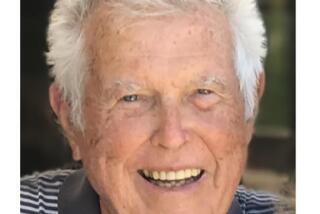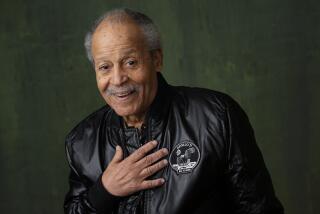Aviation Pioneer Frank Kelley, 74, Dies After Stroke
Aviation pioneer Frank (Bud) Kelley, one of the first Americans to fly a jet airplane, died Wednesday night after suffering a stroke last week. He was 74.
Kelley, who lived in Laguna Beach, took part in the search for aviator Amelia Earhart while a pilot assigned to the aircraft carrier Lexington in 1937. Earhart disappeared over the Pacific while trying to fly around the world.
After serving in the Navy from 1935 to 1940, Kelley became a test pilot for Vought-Sikorsky Aircraft, later for Bell Aircraft Corp. It was with Bell that he became one of the first to fly an American-made jet airplane, according to Donald S. Lopez, deputy director of the National Air and Space Museum. On Nov. 16, 1942, Kelley flew the XP-59 over Muroc Dry Lake, which is now Edwards Air Force Base.
Testing Helicopters
Three years later, Kelley began testing Bell’s helicopters, such as the Model-30.
Although Kelley had his share of triumphs with Bell, he did have some close calls, according to his son, Pete Kelley. Before testing the jet airplane, Kelley went up in Bell’s Airacobra and had to bail out at 2,000 feet.
On his second flight in the Airacobra, Kelley had problems again but decided to stick it out and landed the plane despite extensive damage, an incident his son said characterized his daredevil attitude.
“He would have rather died than bail out a second time,” said his son.
His family described him as an “upbeat, caring and gregarious” person. “He did a lot of wild and daring things,” Kelley’s daughter, Jane Dramin said.
After leaving Bell, Kelley moved to Hughes Aircraft Co. In 1962 he moved to the Federal Aviation Administration. There he worked with flight standards, testing the airworthiness of airplanes and investigating accidents.
He retired from the FAA in 1979 and moved to Laguna Beach. He is survived by his wife of 30 years, June, and his children Judy Gardner, 48; Frank Jr., 46; Pete, 42; Jane Dramin, 36, and six grandchildren.
More to Read
Sign up for Essential California
The most important California stories and recommendations in your inbox every morning.
You may occasionally receive promotional content from the Los Angeles Times.










